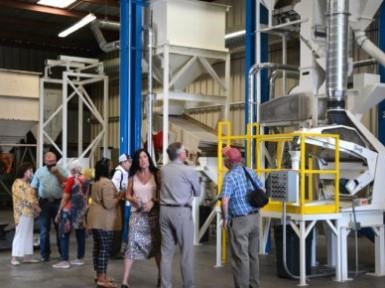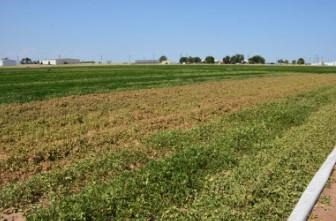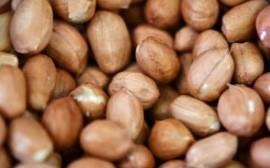The longtime goal to preserve both peanut quality and seed integrity is a step closer after Texas A&M AgriLife and the Texas Peanut Producers Board jointly unveiled a new $1 million-plus peanut sheller.

A crowd, including members of the Texas Peanut Producers Board, gathered for the unveiling of a new one-of-a-kind peanut sheller at the Texas A&M AgriLife Foundation Seed facility. (Texas A&M AgriLife photo by Kay Ledbetter)
The sheller has a 1-ton per hour capacity, can process lots as small as 250 pounds and offers the rare ability to process identity-preserved peanuts. Also, with design modifications built in by Bratney Corp., the new peanut sheller can reduce split-seed losses to less than 10%.
The capacity the sheller can handle, combined with its exceptional ability to clean and sort seeds, makes it one of a kind, said Patrick J. Stover, Ph.D., vice chancellor of Texas A&M AgriLife, dean of the College of Agriculture and Life Sciences and director of Texas A&M AgriLife Research.
“With the technology we are unveiling today, Texas A&M AgriLife Foundation Seed can now work with both food companies and farmers in an identity-preserved production system that delivers specific peanuts to end users,” Stover said. “Now AgriLife-bred peanuts can specifically target improved nutritional traits, benefiting the consumer and also enhancing value for the farmer.”
Stover thanked industry partners Shelly Nutt, Texas Peanut Producers Board executive director, and Bob Parker, National Peanut Board president and CEO, for their support, saying, “We are incredibly thankful for everything you both do for Texas peanuts and Texas A&M AgriLife.”
Bringing quality assurance to the Texas peanut grower
Because the peanut sheller will preserve both peanut quality and seed integrity, it creates an environment where peanut farmers can grow improved varieties and shellers can sell seed that is both genetically pure and of the highest quality.

“This is huge,” Nutt said. “Our board was created in 1969, and the reason the farmers wanted to self-assess is they wanted a research program that would look at what Texas needed. So, 50 years later, we’re seeing an accomplishment toward a goal our farmers have had all this time.”
This facility gives peanut farmers access to a pure, high-quality seed from varieties specifically suited for Texas’ unique environment, along with the Southwest growing region.
Texas peanuts, and the farmers and businesses that make up the peanut industry, are valuable to Texas agriculture. Texas is the fourth largest peanut-growing state in the nation, with nearly 170,000 acres planted by Texas peanut producers in 2021. In 2020, Texas produced 8% of the peanuts grown in the nation, with an average yield of 2,900 pounds per acre.
“This peanut shelling plant is vitally important to gain the respect of the seed industry and to make our varieties the industry standard in not only value-added traits but also in the quality,” Nutt said. “The Texas peanut industry really appreciates this, and we look forward to working with Texas A&M AgriLife and Texas A&M Foundation Seed for years to come.”
A game-changer in the marketplace
Assuring the purity of the peanut supply is critical to maintaining and growing markets both domestically and internationally, Parker said. He thanked the Texas A&M College of Agriculture and Life Sciences for supporting the peanut seed program and to the peanut owners in Texas for such a substantial investment in this program.

Per capita consumption of peanuts rose to a record high of 7.9 pounds this past year. (Texas A&M AgriLife photo by Kay Ledbetter)
“The ability to test single seeds of high oleic peanuts really exposed the problem we had with mixtures in our peanut seed system and the lack of purity in our peanuts,” he said.
Parker said while It’s been a long time coming, this is a good time for a facility like this to be brought online to address a growing market.
“The final assessment notice for 2021 just came in, and the U.S. broke the all-time record for per capita peanut consumption last year – 7.6 pounds – and built on that this year to around 7.9 pounds per capita,” he said.
Rick Vierling, director for the Texas A&M AgriLife Research and Extension Center at Vernon and Texas A&M AgriLife Foundation Seed, said “if someone wants to do only high oleic peanuts – we can do that. Right now, it is very difficult for a larger operation to shell identity-preserved peanuts. However, since we operate at only 1 ton an hour, we can clean out and switch to different peanuts for a minimal cost.”
Another benefit of the new sheller, which will begin processing peanuts after harvest later this year, is it is capable of screening for a better quality of seed for production, Vierling said. The larger shellers are not designed to do that – and improved seed quality gives the producer a better stand and ultimately better yields.
“We are making huge strides here at Foundation Seed and this certainly will give us the impetus to continue our mission of serving Texas and adding value to the state economy,” Vierling said.
Source : tamu.edu